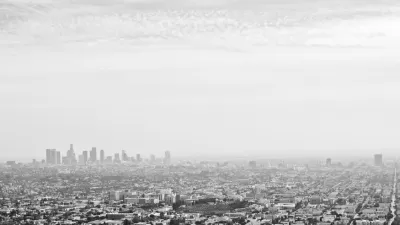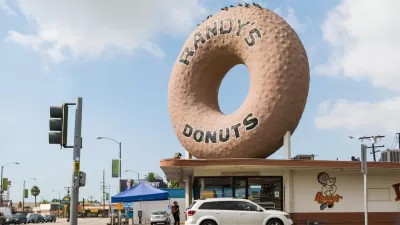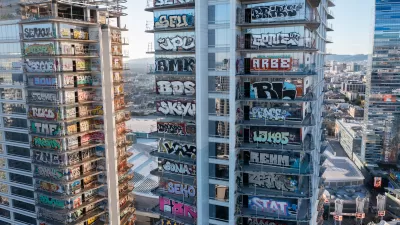A mixed-use development proposal in South L.A. highlights a blind spot of progressive urbanism—the gap between what checks all the boxes and what low-income communities really need.

The development known as The Reef is all about "placemaking." Located next to a Metro rail station, it aims to increase density as well as housing supply, attract investors to South Los Angeles, and create jobs through a local-hire agreement.
In addition to your typical mixed-use fare—residential, hotel, retail, and restaurant—the billion-dollar project will ultimately include amenities designed to meet specific community needs: a grocery store, a pharmacy, a bank, investment in a new DASH route (the hyper-local bus service run by LADOT).
But what residents want is much more basic: not to have to leave once the project moves in.
In an important analysis in Streetsblog LA, Sahra Sulaiman writes:
To an urbanist or a livability advocate, [The Reef's] approach might sound like it hits all the right notes … But to a lower-income black or Latino resident of Historic South Central – a historically disadvantaged community with the distinction of having the most overcrowded housing in the country – that approach and its potential ripple effects present a much more complicated and far less rosy picture.
Plans presented at public meetings "pitted members of the community against each other by seemingly asking them to make the impossible choice between jobs and housing," she explains. The promise of mostly temporary jobs belied the certainty of long-term increases in rents and the cost of living—leading to likely permanent displacement.
Community activists like the UNIDAD coalition (which went up against Geoff Palmer’s Lorenzo project in 2011) want The Reef to skip the fitness center and tackle those consequences head on. Their community benefits proposal asks developers to help secure eviction protections, an emergency rental aid fund, and other anti-displacement tools for residential and commercial tenants, as well as safety solutions that won’t further criminalize youth of color and the homeless.
These demands, Sulaiman writes, reflect "an understanding of how a history of discriminatory planning policies, disinvestment, and disenfranchisement created the very conditions that make the community so favorable to developers today."
But as she also notes, developers are only one piece of the puzzle. The difference between what they can or are willing to offer, and what residents want and need, "highlight[s] how few tools we actually have at our disposal to ensure our communities become more inclusive as they grow."

Maui's Vacation Rental Debate Turns Ugly
Verbal attacks, misinformation campaigns and fistfights plague a high-stakes debate to convert thousands of vacation rentals into long-term housing.

Planetizen Federal Action Tracker
A weekly monitor of how Trump’s orders and actions are impacting planners and planning in America.

In Urban Planning, AI Prompting Could be the New Design Thinking
Creativity has long been key to great urban design. What if we see AI as our new creative partner?

Pedestrian Deaths Drop, Remain Twice as High as in 2009
Fatalities declined by 4 percent in 2024, but the U.S. is still nowhere close to ‘Vision Zero.’

King County Supportive Housing Program Offers Hope for Unhoused Residents
The county is taking a ‘Housing First’ approach that prioritizes getting people into housing, then offering wraparound supportive services.

Researchers Use AI to Get Clearer Picture of US Housing
Analysts are using artificial intelligence to supercharge their research by allowing them to comb through data faster. Though these AI tools can be error prone, they save time and housing researchers are optimistic about the future.
Urban Design for Planners 1: Software Tools
This six-course series explores essential urban design concepts using open source software and equips planners with the tools they need to participate fully in the urban design process.
Planning for Universal Design
Learn the tools for implementing Universal Design in planning regulations.
planning NEXT
Appalachian Highlands Housing Partners
Mpact (founded as Rail~Volution)
City of Camden Redevelopment Agency
City of Astoria
City of Portland
City of Laramie





























